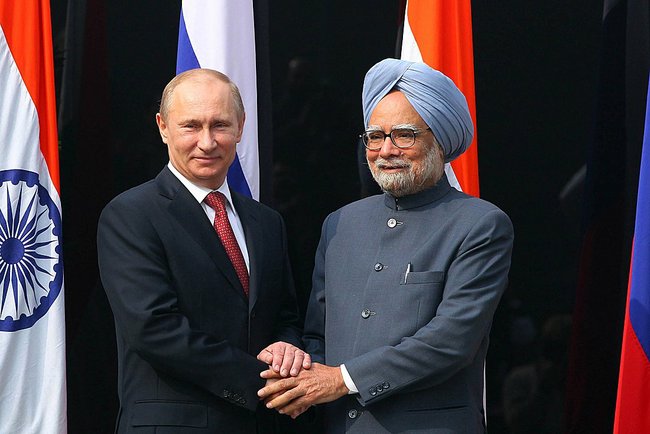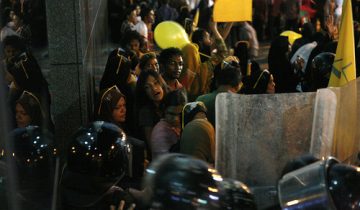After Crimea: India, China, and the Ukraine Crisis

Wherever you live, imagine the ties holding you to millions of other people into a cohesive country. It is more than just the same government–would you cease to be connected if a new government was instituted? No–Instead, there is a force, the force of nationalism–the sense of a cohesive identity as a nation, which links people, creates patriotism, and makes entire countries act as one. This force was responsible for both World Wars, but also for the abolition of slavery in the United States and India’s independence. In recent months, nationalism’s effect is once again being seen in a conflict between Russia and the rest of Europe over Ukraine and the Crimean Peninsula.
Background
Starting November 2013, Ukrainian citizens took to the streets of Kiev to protest President Viktor Yanukovych’s postponing the signing of a trade deal with the EU , a deal he had promised–and now failed–to sign. Yanukovych, under severe pressure from Russia, instead decided to negotiate with President Vladimir Putin for economic aid, to the anger of pro-European protesters. For months, the protesters grew in number, becoming increasingly impatient at government inaction, and outraged at anti-protest laws enacted by the government.
By the end of February, Yanukovych was removed from office, and a new, pro-Western government was established. Things seemed well on their way to cooperation between Ukraine and the EU. Except, not everybody wanted it.
Ukraine, created during the decline of the Soviet Union, found itself divided in terms of language, ethnicity, and political association. Several pro-Russian rebel groups formed in response to Ukraine’s new government, concentrated in the Crimean peninsula, to the south of the country. Over the course of the month, rebel groups gained power, calling for and passing a referendum that ceded Crimea to Russia. Meanwhile, Russian forces amassed at the Ukrainian border, seizing the region after the referendum was passed.
The world was left with a question: Do the Crimeans have the ability to choose their nation? Does their national identity matter?
International Responses
Alarmed at Russia’s aggressiveness, the US and EU began to launch waves of sanctions against Russian leaders and aristocrats. Both refused to accept the referendum in Crimea, citing it as unconstitutional and illegal. Russia, on the other hand, argued that the decision was just as ‘legal’ as the ousting of Yanukovych in February. The UN, in response to conflicting interests, called a vote on the territorial integrity of Ukraine; whether the choice of the Crimean referendum was legal. The votes for and against the referendum were relatively unsurprising– Russia supported itself, along with Belarus, North Korea, Venezuela, and a small handful of other nations, while Ukraine, the US, the EU, and many of their allies rejected the referendum. Interesting, however, are the numerous countries who abstained from voting, including Brazil, India, China, and South Africa– four major developing countries. For China, in particular, a look at the history of the nation provides clues as to its decision, and India’s choice between Russia and the West will have resounding consequences.
In both countries, however, actions in recent days are pointing to increased support of Russia in the crisis. There is a sense that, in this post-Crimean world, we can now more clearly see that the US-dominated politics of the last two decades are coming to a close. Russia, along with these developing powers, is now taking matters into its own hands.
China and India – The Developing Superpowers
As China was leaving a period of isolationism in the late 1800s and early 1900s, relatively successful movements formed that strengthened the Chinese national identity by expelling the foreign, Manchu rulers and seeking to strengthen China against Western powers. Today, even as allies of Russia, China does not support major powers encroaching on the rights of weaker countries– a contributing factor (among others such as economic interests) to their abstaining from the vote.
India, a historic supporter of Russia, is also seeking closer ties to Western nations, causing the nation’s abstaining from the vote. Any actions by India regarding Crimea could tip the balance in either direction– India has a choice to make. In the country, there are differing opinions as to the alignment of India. Some argue that India is balancing itself between the decisions, implying support of Russia while not fully committing itself. Others believe that India should fully back Russia, seeing as Crimea fully voted to join a long-time ally. Yet, both sides agree on the potentially problematic situations that could develop from a pro-Russian choice.
Nationalism in India
Indian nationalism was borne of resentment against British rule, best expressed by the first Indian National Congress. As India gained independence, however, it was not granted unity — instead, it was split into Hindu-dominated India and Muslim-dominated Pakistan (which itself broke into Pakistan and Bangladesh). As with most freedoms from empires, India’s border was not reflective of cultural divisions, leading to one of the heaviest-disputed regions in the world, Kashmir, having claims by 3 different nuclear powers: India, Pakistan, and (to a small extent) China.
How does this relate to Crimea? Support of a cultural group leaving a union to side with their nationality is dangerous in contested areas. Indian support of Russia, and thus Crimea, is dangerous for a nation where interstate disputes are becoming more common. Setting a precedent to give the people control of their national identity through revolution would likely cause issues in disputed regions, as a strong Kashmiri rebellion could lead the entire region into turmoil.
India needs to be cautious. Given the choice between supporting Russia and the West, the nation needs to decide whether national integrity is more or less important than long-time alliances.
This small event in Crimea could be insignificant. But, as countries decide whether to acknowledge the referendum, it is becoming increasingly likely that the major effects of the Ukrainian Revolution are just beginning.
[Image Attribute: Website of the President of Russia]



